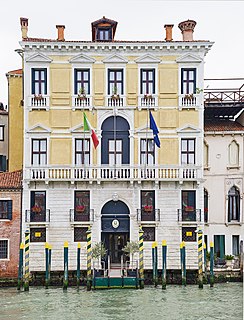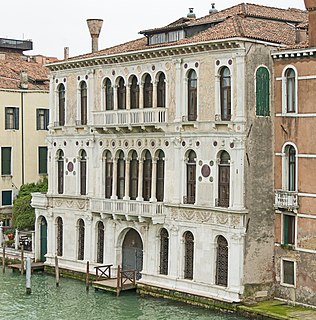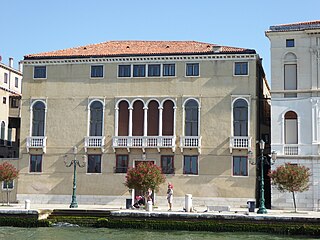The Grand Canal is a channel in Venice, Italy. It forms one of the major water-traffic corridors in the city.

Palazzo Grassi is a building in the Venetian Classical style located on the Grand Canal of Venice (Italy), between the Palazzo Moro Lin and the campo San Samuele.

Venetian Gothic is the term used for the particular form of Italian Gothic architecture typical of Venice, originating in local building requirements, with some influence from Byzantine architecture, and some from Islamic architecture, reflecting Venice's trading network. Very unusually for medieval architecture, the style is both at its most characteristic in secular buildings, and the great majority of survivals are secular.

The Palazzo Grimani di San Luca is a Renaissance-style palace, located between the Palazzo Corner Valmarana and the Rio di San Luca and the flanking Palazzo Corner Contarini dei Cavalli on the Grand Canal in the sestiere of San Marco of the city of Venice, Italy.

Palazzo Malipiero is a palace in Venice, Italy. It is on the Grand Canal in the central San Samuele square. It stands just across from the Palazzo Grassi Exhibition Center.

The Palazzo Grimani of Santa Maria Formosa is a State museum, located in Venice in the Castello district, near Campo Santa Maria Formosa.

The Palazzo Ferro Fini is a historical building in Venice, Italy. It was originally two buildings, the Palazzo Morosini Ferro and the Palazzo Flangini Fini, which were combined into one in the 1860s to create the luxury Hotel New York. The hotel was occupied by troops in World War II (1939–45). By 1970 the hotel was in decay, and the building was purchased by the Veneto region, which undertook extensive renovations and made it the seat of the regional council.

The Palazzo Contarini delle Figure is a Renaissance-style palace located between the Palazzo Mocenigo Ca' Vecchia and Palazzo Erizzo Nani Mocenigo, across the Grand Canal from the Palazzo Civran Grimani in the sestiere di San Marco in the city of Venice, Italy.

The Palazzo Civran is a Neoclassical style palace, located between the Campiello del Remer and the smaller Palazzo Perducci on the Grand Canal in the sestiere of Cannaregio in Venice, Italy. There is a separate Palazzo Civran Grimani on the Canal.

The Palazzo Loredan Cini is a Gothic-style palace located between the Palazzo Balbi Valier and the Rio San Vio on the Grand Canal, in the sestiere of Dorsoduro, Venice, Italy. The palace was formed from the amalgamation of the former Palazzo Foscari-Loredan with the adjacent Palazzo Grimani. The narrow facade on the Canal has no entrance, but the facade to the north on the Rio, has a single water door, and is connected to the adjacent campo by a bridge. The facade is decorated with two poliforas.

Palazzo Contarini Dal Zaffo, also known as Palazzo Contarini Polignac is a large palace in Venice, located in the Dorsoduro district, overlooking the Grand Canal, in an intermediate position between Palazzo Brandolin Rota and Palazzo Balbi Valier.

Palazzo Contarini Fasan is a small Gothic palace in Venice, Italy, located in the San Marco district and overlooking the Grand Canal. The palazzo is also called the House of Desdemona.

Palazzo Correr Contarini Zorzi is a Renaissance palace in Venice, Italy, overlooking the Grand Canal and locating in the Cannaregio district between Palazzo Querini Papozze and Palazzo Gritti. The palazzo is also known as Ca' dei Cuori, a family whose wrought iron coats of arms is present on the façade.

Palazzo Emo Diedo is a neoclassical palace in Venice, Italy located in the Santa Croce district, overlooking the Grand Canal, opposite the railway station. The building is located near San Simeone Piccolo.

Palazzo Adoldo is a Renaissance palace in Venice, located in the Santa Croce district and overlooking the Grand Canal. On the right there is the church of San Simeon Piccolo, on the left—Palazzo Foscari Contarini.

Palazzetto Tiepolo or Palazzo Soranzo Pisani is a 15th century palace in Venice, located in the San Polo district and overlooking the right side of the Grand Canal, between Palazzo Tiepolo and Palazzo Tiepolo Passi. The name Palazzo Soranzo Pisani reflects the noble families Sorenzo and Pisani. Thus, including the present owner the Passi Family and the Tiopolo family, the palace has been in the possession of four noble venetian families.

Palazzo Dandolo Paolucci is a Renaissance palace in Venice, Italy, located in the San Polo district and overlooking the Grand Canal. The palazzo neighbors Palazzo Dolfin and Palazzo Civran Grimani.

Palazzo Giustinian Pesaro is a Gothic palace located in Venice, Italy, in the Cannaregio district and overlooking the Grand Canal. The palazzo is situated between Ca' d'Oro and Palazzo Morosini Sagredo.

Palazzo Giustinian Recanati is a palace in Venice, Italy, located in the Dorsoduro district and overlooking the Giudecca Canal, just to the left of Palazzo Clary.

Palazzo Memmo Martinengo Mandelli is a palace in Venice, Italy, located in the Cannaregio district, overlooking the left side of the Grand Canal, between Palazzo Gritti Dandolo and the Church of San Marcuola.























